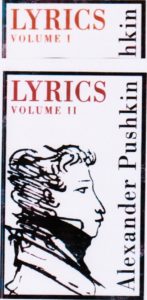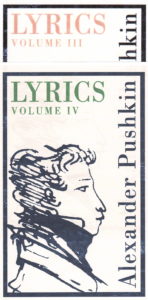
 These four volumes are unique. They attempt for the first time to present to readers in the English-speaking world a complete annotated collection, in both Russian and English, of Pushkin’s output of almost 800 shorter verses.
These four volumes are unique. They attempt for the first time to present to readers in the English-speaking world a complete annotated collection, in both Russian and English, of Pushkin’s output of almost 800 shorter verses.
Pushkin wrote these poems from his childhood and early schooldays to near his death at the age of 37. Normally, of course, they are in Russian, but occasionally he composed in French. They extend from deeply felt expressions of love and friendship, joy and pain, through acute and sensitive reflections on life, through polished and entertaining society verse, to jokes, invectives, and epigrams; they include verse epistles, ballads, stories, descriptive pieces, light songs and formal odes; they comment, sometimes in earnest but often tongue-in-cheek, not only on personal and social matters, but on literature, politics, history, philosophy and religion; and they embrace not only purely original work but adaptations, imitations and parodies, not only of Russian literature and folklore but also of poetry from the Greco-Roman world, modern Europe and the Middle East.
Pushkin had some poems published during his lifetime. Many he left unpublished for various reasons – because they would not pass the censorship, because they were personally sensitive, because they were of limited public interest, or simply because he was not yet satisfied with them; these were collected from his papers or those of others after his death and published in later years. In this edition I have arranged the poems, whether published or unpublished by Pushkin, in broad chronological order of composition (so far as that can be ascertained).
Many of the poems have a strong autobiographical element, illuminating Pushkin’s personal and social life and his emotional development, from ebullient boyhood, through impetuous youth and more measured maturity, into the regrets and frustrations of middle age. But this material must be interpreted with care. The dating of the poems is sometimes conjectural. Also, for understandable reasons, Pushkin often disguised the real addressees or targets of his poems behind pseudonyms or anonymity. And although a real woman, for example, may have been the original inspiration for a love poem, the facts may have crystallised into something more abstract and generalised by the time Pushkin came to write it down. Extracting autobiography from Pushkin’s subjective memory, creative inspiration and pure artifice has to be a matter of deduction, intuition and conjecture.
Even so, the poems certainly contain many references to Pushkin’s real-life contemporaries and predecessors and to contemporary and historical events. They refer copiously also to Russian and European literature and classical mythology. I have tried to explain these references in the Index of Names and in the notes on individual poems. And to help fit the poems, whether autobiographical or not, into the framework of Pushkin’s life, a short biography of Pushkin is also provided.
As editor my intention has been to present Pushkin’s poems, whether translated by myself or others, in a clear and natural modern English, unobscured by archaic or obsolete “poetic” language (unless the context requires). This, I believe, is truest to Pushkin’s own normally direct and informal style, as well as being most accessible to today’s English reader.
Pushkin habitually rhymes all his lines. Fully rhymed English translations are problematical, however. It is much harder to find natural rhymes in English than in Russian. Because of this it is difficult to avoid the struggle for English rhymes distorting the meaning of Pushkin’s original text and forcing the English into unnatural phraseology. Despite this, the translations I have chosen strive to produce faithful and fluent versions that in most cases still replicate Pushkin’s metre and rhyme schemes. Witty epigrams will lose their pointedness without rhyme; and unrhymed translations of song-like poems written in regular stanzaic form will not do justice to the formal beauty of Pushkin’s originals. In a minority of cases – some narrative or epistolary verse, for example, where poetic form is less important than subject matter – I have judged that Pushkin’s intentions will best be realised for the English reader in unrhymed verse, in the manner of my translation of Ruslán and Lyudmíla.
To buy a copy, click here